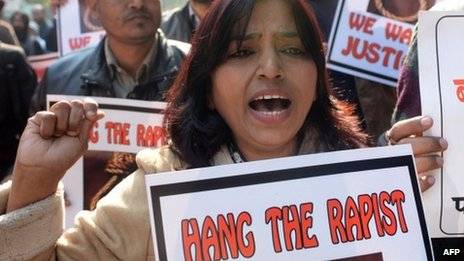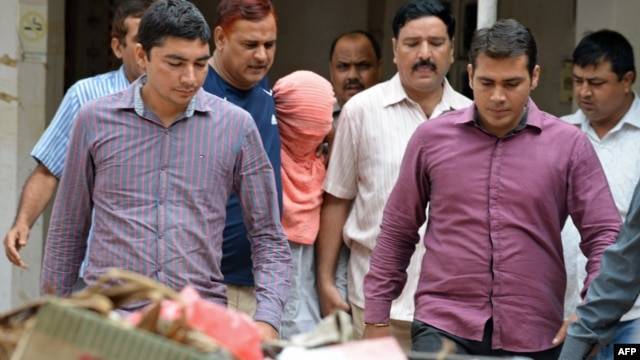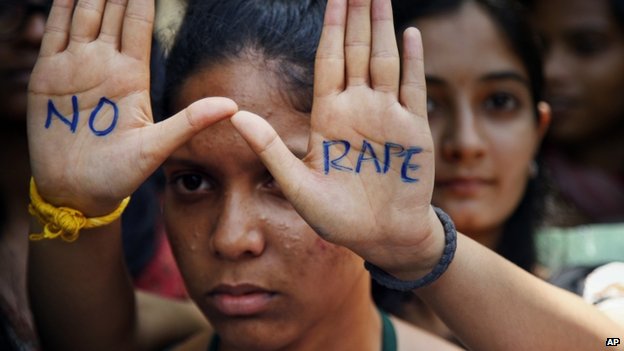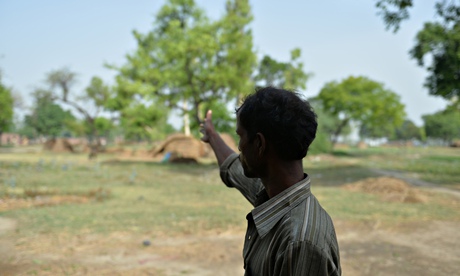waltky
Wise ol' monkey
Such savages do not deserve to live...

Delhi gang rape suspects 'did not mean to murder'
21 Jan 2013 - All five defendants are expected to return to court later this week when the court will officially frame charges
See also:
Trial of Delhi gang-rape suspects begins
Tue, Jan 22, 2013 - ‘HEINOUS’: The father of the victim said his mourning would not end until the culprits were swiftly hanged, but a request to transfer the trial outside Delhi could delay it
Delhi gang rape suspects 'did not mean to murder'
21 Jan 2013 - All five defendants are expected to return to court later this week when the court will officially frame charges
The men accused of the gang-rape of a 23-year-old Indian student, who died from horrific internal injuries inflicted by an iron rod, did not intend to kill her and are not guilty of murder, one of their lawyers claimed as their trial began. Had they intended to kill the victim, they would have strangled her or attacked another of her vital organs, advocate AP Singh, who is acting for two of the five defendants, said outside the court on Monday. Both of his clients deny any part in the assault, gang-rape and murder of the woman who said she was attacked by six men in December after she and a friend boarded a bus on their way home from the cinema. In a statement taken as she was being treated in hospital, she said she had been raped by all of the accused and subjected to an attack with an iron bar which destroyed her bowels and intestines. She died 13 days later in a hospital in Singapore.
The attack provoked protests throughout India and calls for the perpetrators to be given the death penalty. Five men, each with their faces hidden by scarves and balaclavas, appeared in Delhi's Saket court today. Ram Singh, his brother Mukesh, Pawan Gupta, Vinay Sharma and Akshay Thakur are all accused of kidnap, gang-rape and murder, while a sixth unnamed defendant is being treated as a juvenile and will be tried in a separate court. The judge Yogesh Khanna dismissed a defence plea for the trial to be conducted in public, upholding an earlier ruling that it should be in-camera. Outside the court, AP Singh claimed one of his clients, Mr Sharma, is in fact 17-years-old and should be tried in a juvenile court. He was not on the bus on the evening of the attack but at his home, he added.
Mr Thakur, his second client, was on the bus as its cleaner at the time of the assault, but had neither raped nor attacked the victim. He had seen a "quarrel" but had not witnessed a sexual assault. When asked how the victim had suffered the injuries and how he explained forensic evidence of semen on the bus, Mr Singh said "anything can happen in a quarrel." "The rod was not intended to kill, there was no intention to murder...[the removal of] 95 per cent of the intestines is not intention to murder," he said. "There is no evidence of rape or that she was killed because of assault." He will argue that, at worst, the defendants are guilty of 'culpable homicide' - which carries a sentence of between seven to 10 years. All five defendants are expected to return to court later this week when the court will officially frame charges drafted by the police.
Delhi gang rape suspects 'did not mean to murder' - Telegraph
See also:
Trial of Delhi gang-rape suspects begins
Tue, Jan 22, 2013 - ‘HEINOUS’: The father of the victim said his mourning would not end until the culprits were swiftly hanged, but a request to transfer the trial outside Delhi could delay it
Five men went on trial yesterday over the fatal gang rape of a student on a bus in Delhi as the victim’s father urged the special fast-track court to deliver swift justice and sentence her attackers to hang. With the case being held behind closed doors and subject to a gag order, it was left to one of the prosecutors to announce the start of the case to reporters packed outside the sessions court in New Delhi. “The trial has begun,” Dayan Krishnan said. “The charge sheet has been submitted before the judge and the arguments will begin on Jan. 24.” The trial is being held in a special “fast-track” court in the capital set up to circumvent India’s notoriously slow justice system, with the victim’s family leading widespread calls for quick closure on the horrifying case.
The start of the trial was delayed until late in the afternoon by a failed application to overturn the gag order, while a lawyer for one defendant also sought to move the trial out of New Delhi. The father of the 23-year-old victim said her family would rest only once the culprits were convicted and hanged and he urged judge Yogesh Khanna to complete his work quickly. “We have finished the mourning rituals for my daughter in the village, but our mourning will not end until the court passes down its verdict. My daughter’s soul will only rest in peace after the court punishes the men,” the father said. “It is the duty of the court and the judges to ensure that the final order to punish all the accused is handed down quickly and all the men are hanged. No man has the right to live after committing such a heinous crime.”
The assault last month on the medical student, who cannot be named for legal reasons, sparked mass protests across India — in particular in New Delhi, which has been dubbed the country’s “rape capital” over the incidence of such attacks. Though gang rapes and sexual harassment are commonplace in India, the case has touched a nerve, leading to an outpouring of criticism of the treatment of women in Indian society. Sonia Gandhi, president of India’s ruling Congress party, on Sunday condemned the “shameful” social attitudes that she said led to crimes like gang rape. The New Delhi case had “shaken the entire country,” she added. The five men face murder, rape, robbery, kidnapping and other charges, with prosecutors expected to demand the death penalty. A sixth suspect, who claims he is 17, will be tried by a separate juvenile court.
Defense lawyers say they will enter not-guilty pleas and accuse police of torturing the adult defendants — aged between 19 and 35 — to confess. The woman, a promising student whose father worked extra shifts as an airport baggage handler to educate her, suffered massive intestinal injuries during the assault on the bus in which she was raped and violated with an iron bar. She died 13 days later after the government airlifted her to a Singapore hospital in a last-ditch bid to save her life. In a move that could lead to a significant delay to proceedings, the Supreme Court yesterday agreed to consider a request to transfer the trial to a venue outside New Delhi.
http://www.taipeitimes.com/News/world/archives/2013/01/22/2003553158
Last edited:







